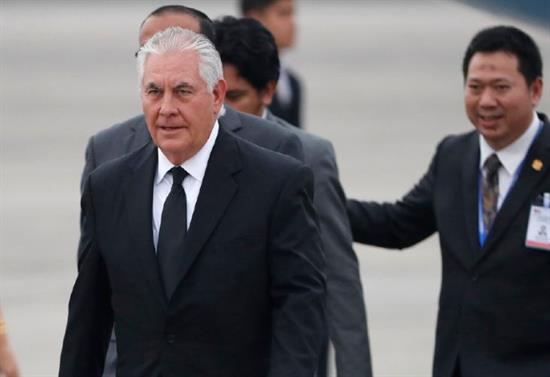Rep. Carbajal Writes Sec. Tillerson Urging Diplomatic Resolution in North Korea
Washington,
August 10, 2017
After Nuclear Threats from Regime, Over 60 U.S. Congressmen Criticize President’s “Irresponsible and Dangerous” Rhetoric Upon sending the letter, Rep. Carbajal, member of the House Armed Services Committee added, “When dealing with an unpredictable regime like North Korea, inflammatory and improvised rhetoric puts our national security and the lives of our servicemembers at risk. It is essential that the Administration exhaust all diplomatic measures when dealing with this tenuous region and not jump so immediately to threats of nuclear war.” The letter supports Tillerson’s recent diplomatic approach “calling for direct talks with North Korea and offering assurances that our country is not their enemy and does not seek war or regime change.” This follows a letter Carbajal sent with his colleagues in May 2017 in response to the President’s previous threats of military escalation in the Asia-Pacific region. Full text of the letter is available here and below: Dear Secretary Tillerson, We write to express our profound concern over the statements yesterday by President Trump that dramatically increased tensions with North Korea and raised the specter of nuclear war. These statements are irresponsible and dangerous, and also senselessly provide a boon to domestic North Korean propaganda which has long sought to portray the United States as a threat to their people. Accordingly, we respectfully but firmly urge you to do everything in your power to ensure that President Trump and other Administration officials understand the importance of speaking and acting with the utmost caution and restraint on this delicate issue. Congress and the American public will hold President Trump responsible if a careless or ill-advised miscalculation results in conflict that endangers our servicemembers and regional allies. To allay these concerns, the Trump Administration should publicly declare its agreement with the constitutional requirement that any preemptive attack on North Korea must be debated and authorized by Congress. As 64 Members of Congress wrote in May, “Military action against North Korea was considered by the Obama, Bush and Clinton Administrations, but all ultimately determined there was no military option that would not run the unacceptable risk of a counter-reaction from Pyongyang [that] could immediately threaten the lives of as many as a third of the South Korean population, put nearly 30,000 U.S. service members and over 100,000 other U.S. citizens residing in South Korea in grave danger, and also threaten other regional allies such as Japan.” Simply put, there is no military solution to this problem. We strongly support your recent statements calling for direct talks with North Korea and offering assurances that our country is not their enemy and does not seek war or regime change. This accords with the approach that 64 Members of Congress urged in the letter to President Trump, and is also backed by leading experts on US-North Korea policy, including former Secretary of Defense William Perry, former Secretary of State George Schultz and former Senator Richard Lugar who have stated that our country “should make clear that the United States does not have hostile intentions toward North Korea.” An approach that includes these elements has shown promise in the past. In 1994, after North Korea’s announced their intent to withdraw from the Nuclear Nonproliferation Treaty (NPT), the United States and North Korea engaged in direct diplomacy, resulting in the Agreed Framework. Under the pact, Pyongyang agreed to freeze its nuclear program, while U.S. committed to provide fuel for electricity to offset the power lost from shutting down their plutonium reactor. Despite allegations from both sides of non-compliance with the agreement, North Korea did not reopen their plutonium reactor, and in October 2000, the two countries pledged in writing that neither would have “hostile intent” towards the other. This progress was regrettably and unnecessarily halted after the Bush Administration took office, as then-Under Secretary of State for Arms Control and International Security John Bolton publicly admitted that he was “looking for [a hammer] to shatter the Agreed Framework.” We are grateful that you understand the urgent need to make a good faith effort to replicate these successes and we urge you to minimize preconditions in order to bring the North Koreans to the table and commence dialogue at the earliest possible date. Finally, we respectfully request your assistance in receiving a response to our initial inquiry in our May letter. Kindly provide us information about the specific steps your Administration is taking to advance the prospects for direct negotiations that could lower the potential for catastrophic war and ultimately lead to the denuclearization of the peninsula. We also request any plans you may have to address important humanitarian issues of mutual concern such as the reunification of Korean and Korean-American families as well as the repatriation of the remains of US servicemen left in North Korea following the War, including whether these or other humanitarian efforts will be impeded by your newly announced travel ban. We look forward to working with you to support crucial diplomatic initiatives and avoid catastrophic war that will harm American interests. Sincerely, [Members of Congress]
|
- Home
- About
- Services
- Help with a Federal Agency
- Congressional Art Competition
- Congressional App Challenge
- Congressional Commendations
- Congressional Women of the Year
- Flag Request
- FY2027 Appropriations Requests
- FY2027 National Defense Authorization Act Requests
- FY26 Community Projects
- Know your Immigration Rights
- Grants
- Internships
- Military Academy Nominations
- Tour Requests
- Issues
- Media
- Contact



